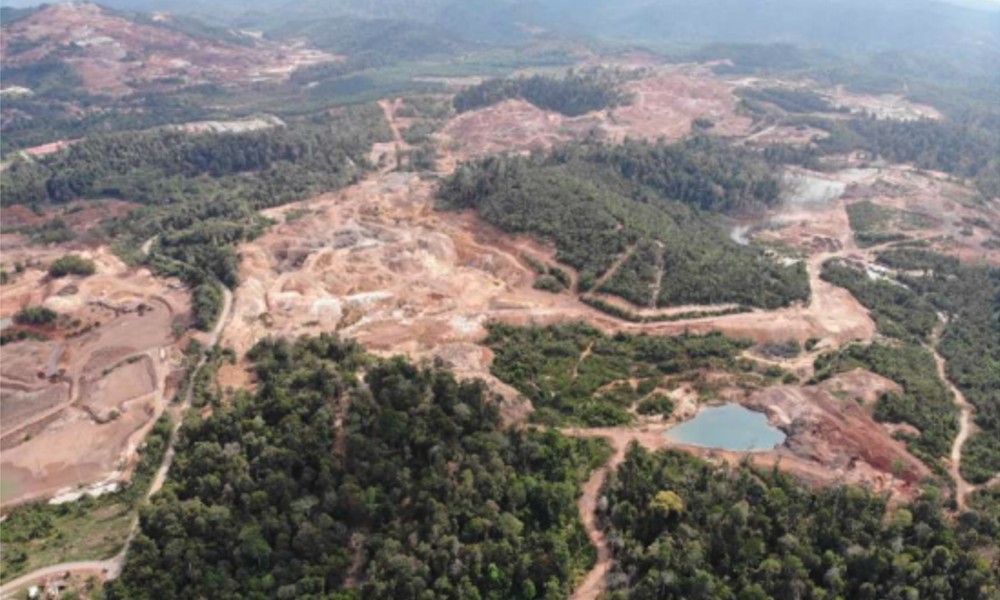Peka urges Pahang MB to revoke approval for Tasik Chini mining project
Environmental group Pertubuhan Pelindung Khazanah Alam Malaysia (Peka) has called on Pahang Menteri Besar Wan Rosdy Wan Ismail to revoke the state government’s approval of mining activities near Tasik Chini, involving a company linked to royalty.
Peka president Shariffa Sabrina Syed Akil in an open letter to Wan Rosdy said the state government would be forced to bear the long-term cost of the natural disasters that would follow in the aftermath of the mining.
"Peka strongly objects to the approval that has been given to this project, which is located just 3km from Tasik Chini, which is an environmentally vulnerable area.
“The Pahang government will bear losses and spend more on fixing damaged infrastructure and goodwill aid to people affected, some who might lose their homes and even their lives," Shariffa said.
Malaysiakini reported last week that the Pahang government has approved mining operations in the vicinity of Tasik Chini in Pekan to a royalty-linked company, despite its pledge to rehabilitate the country's second-largest natural lake.
The new mining site is located about 3km away from Tasik Chini, a Unesco Biosphere Reserve which has in recent years grappled with pollution from mining and logging.
According to environmental impact assessment (EIA) documents that went on public display in April, the mining project will cover 40.51ha - the size of around 60 football fields - at Lot 89798 in Mukim Penyor.
Tasik Chini is one of two Unesco-designated biosphere reserves in Malaysia and was gazetted as a forest reserve in 2019 and as a state park a year later.

"Forest reserves should be developed as an ecotourism or agro-tourism location, thus maintaining the stability of the ecosystem and water catchments.
"Tasik Chini needs to be protected and all logging activities and mining activities need to halted to maintain the lake’s biosphere and to allow the condition of islands on the lake to be improved," Shariffa said.
She also pointed to Orang Asli settlers in the area who she said were dependent on Tasik Chini as their source of income.
She said that among the problems that have arisen as a result of environmental pollution in this area ready are:
a. Deteriorating lake water quality;
b. Declining marine life in the water;
c. Local ecological disturbances;
d. Extinction of local biodiversity;
e. Local hydrological disturbances; and
f. The atmosphere of the lake no longer has aesthetic value.
"The pollution and disturbance of the ecology that is happening now can lead to natural disasters.
"For example, pollution of high areas around lakes can cause flooding when it rains down heavily, as reported the previous year.
"Natural disasters like landslides can occur when upland areas have been cleared for the purpose of logging, and subsequently, mining.
“The effectiveness of plants and trees in controlling soil erosion depends on the height of trees’ canopy, the density of plants and the growth of roots," Shariffa said.

She added that temperatures lower than 27°C will also increase soil moisture and inhibit winds, especially at slopes not covered with plants.
"This will then reduce the risk of soil erosion caused by these winds.”
“The state government and relevant agencies can no longer be careless about conserving this lake and efforts must be increased to make Tasik Chini a greater tourist attraction," she added.
Earlier, Malaysian Nature Society (MNS) Pahang chapter chief Noor Jehan Abu Bakar had expressed scepticism over the Pahang government's political will in preserving Tasik Chini.
The environmentalist questioned the logic behind approving another mining activity near the lake despite the state administration planning to develop the area as an eco-tourism spot.
"I believe it is just lip service. They only say it to sugarcoat (the issue), but in reality, their action does not reflect that," Noor Jehan said, expressing fears that a lack of enforcement could lead to the dumping of mining waste into Tasik Chini.
The Environmental Impact Assessment for the area, she noted, had stated that water discharges from mining activities should be channelled into tributaries that lead into the Pahang River, instead of Tasik Chini.
"If you look on paper, it seems that waste would not go into Tasik Chini.
"But the site is nearer to Tasik Chini for them to dump their waste.
"Once the mining starts, what is to stop them from dumping (wastes) into the lake?" Noor Jehan asked. - Mkini
✍ Credit given to the original owner of this post : ☕ Malaysians Must Know the TRUTH
🌐 Hit This Link To Find Out More On Their Articles...🏄🏻♀️ Enjoy Surfing!




















Post a Comment